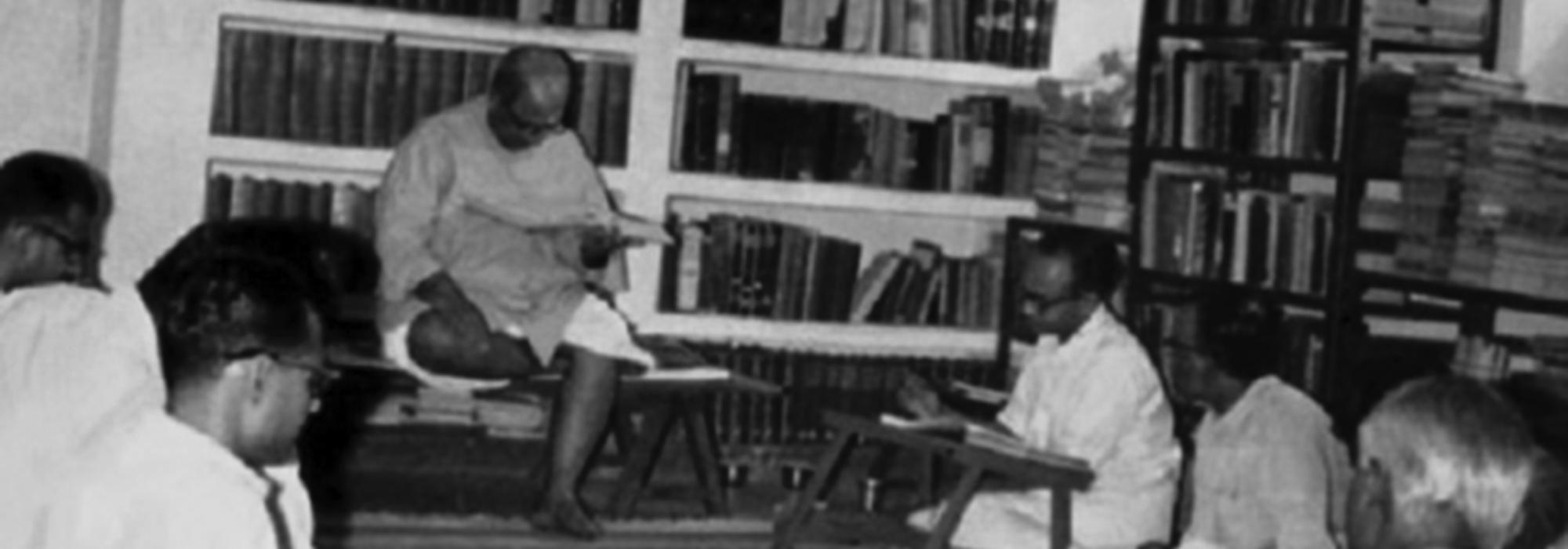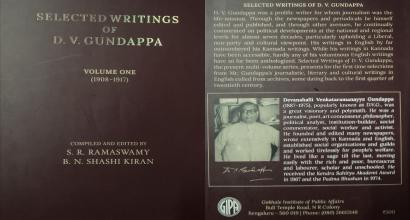[The legendary polymath D V Gundappa was not just a great littérateur, art critic, and connoisseur but an enthusiastic social worker and uplifter of the masses. Starting from 1949 until his death in 1975, DVG regularly conducted a 'study circle' every Sunday at the Gokhale Institute of Public Affairs, Bangalore. This group consisted of around fifteen people including S R Ramaswamy, D R Venkataramanan, and T S Padmanabhan in the early days and over the years, the number of participants slowly increased, reaching a crescendo when DVG discussed the Bhagavad-gītā. Typically, someone from the group would read out a passage from a chosen book and DVG would explain it in detail before moving on to the next passage. In the Public Affairs magazine brought out by GIPA every month, DVG would give a short update about the progress of the GIPA Study Circle. Here is a list of all the works studied in the GIPA Study Circle from 1949 to 1975 compiled by Nadoja Dr. S R Ramaswamy. We at Prekshaa are extremely grateful to him for providing this list for the benefit of our readers. The cover image for this post is taken from one such study circle session. —Editor]
English
1. On Liberty – John Stuart Mill
2. Representative Government – John Stuart Mill
3. Plato and his Dialogues – G. Lowes Dickinson
4. Republic – Plato (Translation: Benjamin Jowett)
5. Indian Citizen: His Rights and Duties – V. S. Srinivasa Sastri
6. Lectures on Political Science – Annie Besant
7. A Government by the People: Constitution of the U.S.A.
8. Man, the Unknown – Dr. Alexis Carrel
9. Saint Joan – George Bernard Shaw
10. Meaning and Purpose – Dr. Kenneth Walker
11. House of Commons at Work – Eric Taylor
12. Sesame and Lilies – John Ruskin
13. On Compromise – John Morley
14. Ancient Law – Sir Henry Maine
15. Selections from Edmund Burke – Edmund Burke
16. Queen’s Government – Sir Ivor Jennings
17. Mahadev Govind Ranade – James Kellock
18. Duties of Man – Joseph Mazzini
19. Unto This Last – John Ruskin
20. Abraham Lincoln – Lord Charnwood
21. Adventures of Ideas – A. N. Whitehead
22. Principles of Social and Political Theory – Ernest Barker
23. Politics – Aristotle
24. History of Europe – H. A. L. Fisher
25. Magna Carta – Sir Ivor Jennings
26. The British Constitution – Sir Ivor Jennings
27. English Constitution – Walter Bagehot
28. A History of Economic Thought – Eric Roll
29. Sanatana Dharma
30. The Life of William Ewart Gladstone (in 3 volumes) – John Morley
31. Recollections – John Morley
32. Lectures on Modern History – Lord John Acton
33. The Challenge of World Poverty – Gunnar Myrdal
Sanskrit and Kannada
1. Rāmāyaṇa (Selections) of Vālmīki
2. Mahābhārata (Selections) of Vyāsa
3. Śānti-parva – Vyāsa
4. Śākuntala – Kālidāsa
5. Śākuntala (Kannada) – Basavappa Sastri
6. Nīti-śataka – Bhartṛhari
7. Nīti-śataka (Kannada) – Basavappa Sastri
8. Vairāgya-śataka – Bhartṛhari
9. Vairāgya-śataka (Kannada) – Basavappa Sastri
10. Manu-dharma-śāstra of Manu
11. Manu-smṛti (Kannada)
12. Īśa-upaniṣad
13. Kena-upaniṣad
14. Kaṭha-upaniṣad
15. Praśna-upaniṣad
16. Muṇḍaka-upaniṣad
17. Māṇḍūkya-upaniṣad
18. Taittirīya-upaniṣad
19. Aitareya-upaniṣad
20. Chāndogya-upaniṣad
21. Bṛhadāraṇyaka-upaniṣad
22. Uttara-rāma-carita of Bhavabhūti
23. Uttara-rāma-carita (Kannada) – Basavappa Sastri
24. Bhagavad-gītā
25. Viṣṇu-sahasra-nāma
26. Aryan Prayer Book (Parabrahma Stutih) compiled by M. B. Srinivasa Iyengar
27. Bhakti-candrikā (Nārada Bhakti Sūtras) – H. H. Sri Satchidanandendra Saraswati
28. Śiva-mahimnaḥ-stotra – Puṣpadanta
29. Śivānanda-laharī – Śaṅkarācārya
30. Campū-Rāmāyaṇa – Bhoja








































